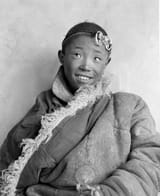Search Results
6/22/2025, 3:21:57 AM
From "The Struggle for Modern Tibet: The Autobiography of Tashi Tsering" (1997) by Melvyn C. Goldstein, William R. Siebenschuh, and Tashi Tsering, pp. 26-30:
>I had not been long in the city again when I was told to deliver something to an important monk official. There I met another monk named Wangdu, who worked as the major-domo of that official. He was extremely cordial, talking with me in a gentle and friendly manner, and I could tell he liked me. It was a pleasant change from the distance usually maintained between superiors and inferiors in Lhasa. I genuinely enjoyed meeting him, but soon forgot about it until, that is, a few days later when Pockmarks called me to his presence and announced:
>“I have been asked to send you to Wangdula [la is a polite suffix added to names], the monk steward you met last week.”
>That was all he said, but I knew immediately what was meant. Wangdu was asking for me to become his homosexual partner. In the manner customary to monks and monk officials in Lhasa, he had asked my superior for permission to invite me, and now I was being asked. For a moment I didn’t know how I wanted to respond, and I stood there speechless, trying quickly to think what to say. Pockmarks became impatient and again asked:
>“What do you say? Will you do it?”
>The question was firm and couldn’t be evaded, but I still didn’t know what I really wanted to say. After all the problems I had in Lhasa, I wasn’t sure if placing myself in a relationship with Wangdu would bring new difficulties or be the start of an era of success. I could have refused. I had no sexual feelings for him or for men in general. But I had liked him and also understood that having an intimate relationship with someone aligned with power and authority was an opportunity not to be lightly dismissed. So I decided to agree, and hesitantly said I would accept the invitation. It was the start of some of the best years of my life.
[Cont. 1/4]
>I had not been long in the city again when I was told to deliver something to an important monk official. There I met another monk named Wangdu, who worked as the major-domo of that official. He was extremely cordial, talking with me in a gentle and friendly manner, and I could tell he liked me. It was a pleasant change from the distance usually maintained between superiors and inferiors in Lhasa. I genuinely enjoyed meeting him, but soon forgot about it until, that is, a few days later when Pockmarks called me to his presence and announced:
>“I have been asked to send you to Wangdula [la is a polite suffix added to names], the monk steward you met last week.”
>That was all he said, but I knew immediately what was meant. Wangdu was asking for me to become his homosexual partner. In the manner customary to monks and monk officials in Lhasa, he had asked my superior for permission to invite me, and now I was being asked. For a moment I didn’t know how I wanted to respond, and I stood there speechless, trying quickly to think what to say. Pockmarks became impatient and again asked:
>“What do you say? Will you do it?”
>The question was firm and couldn’t be evaded, but I still didn’t know what I really wanted to say. After all the problems I had in Lhasa, I wasn’t sure if placing myself in a relationship with Wangdu would bring new difficulties or be the start of an era of success. I could have refused. I had no sexual feelings for him or for men in general. But I had liked him and also understood that having an intimate relationship with someone aligned with power and authority was an opportunity not to be lightly dismissed. So I decided to agree, and hesitantly said I would accept the invitation. It was the start of some of the best years of my life.
[Cont. 1/4]
Page 1
